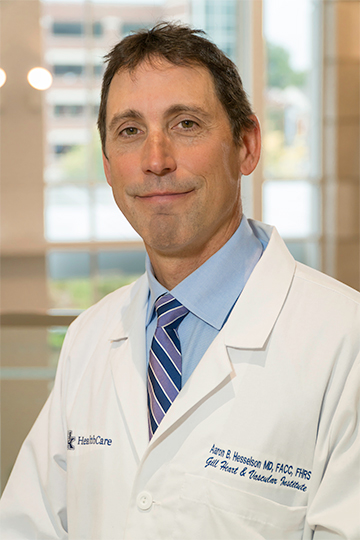BeatHF study and FIX-HF-5CA device
The Gill Heart & Vascular Institute is delving into two cutting-edge technologies that have the potential to provide a better quality of life for a population of advanced heart failure patients that had scant, if any, options to treat their symptoms.
The BeatHF and FIX-HF-5CA studies were driven by the absence of implantable device treatments for advanced heart failure patients who have maxed out their medications, says Dr. Aaron Hesselson, director of Electrophysiologic Services at Gill.
Clinical Research Coordinator Laura True, BSN, RN, CCRN, says these patients fall into a middle ground because they are symptomatic but not to the point where they need a heart transplant or a more in-depth device.
“This is a really specific group of patients who still need some heart failure relief but don’t have any options out there right now for treatment,” she says.

Dr. Hesselson says the BeatHF device works by resetting to the proper autonomic balance. In turn, this can aid other neurohormonal mechanisms that may be upset in heart failure.
While both devices are implanted and look like pacemakers, the BeatHF device attaches to the carotid artery in the neck. “It helps with the baroreceptors there to tell the body, “hey, you are not doing your job; we need you to work a little bit better,” says True. “It kind of tricks the brain into working better to help manage heart failure systems.”
The FIX-HF-5CA device works differently, says Dr. Hesselson. “It works directly on the heart by improving cellular calcium availability necessary for the contraction-coupling mechanism. This stimulation seems to also reverse genetic mechanisms that adversely affect calcium in heart failure.”
The FIX-HF-5CA device goes into the heart and actually helps to make the heart a better pump, says True. “It is working with the contractility of the heart similar to a medication out there called milrinone, but that requires a continuous IV infusion of that drug, and a lot of patients don’t really want that burden.”
Both devices are on "expedited review" by the FDA in an attempt to make them commercially available sooner and give these patients an option, says Dr. Hesselson.
“In fact, the BeatHF study was the first ever to be granted expedited status,” he says.
These treatments if deemed viable and approved by FDA have the potential for significantly improving patient’s quality of life and decreasing health care costs. “We are constantly investigating the newest advancements in technology in order to offer patients the latest, best, most effective treatments,” says Hesselson.
Learn more about our Heart Rhythm ProgramSee more stories from 2018 State of the Heart
